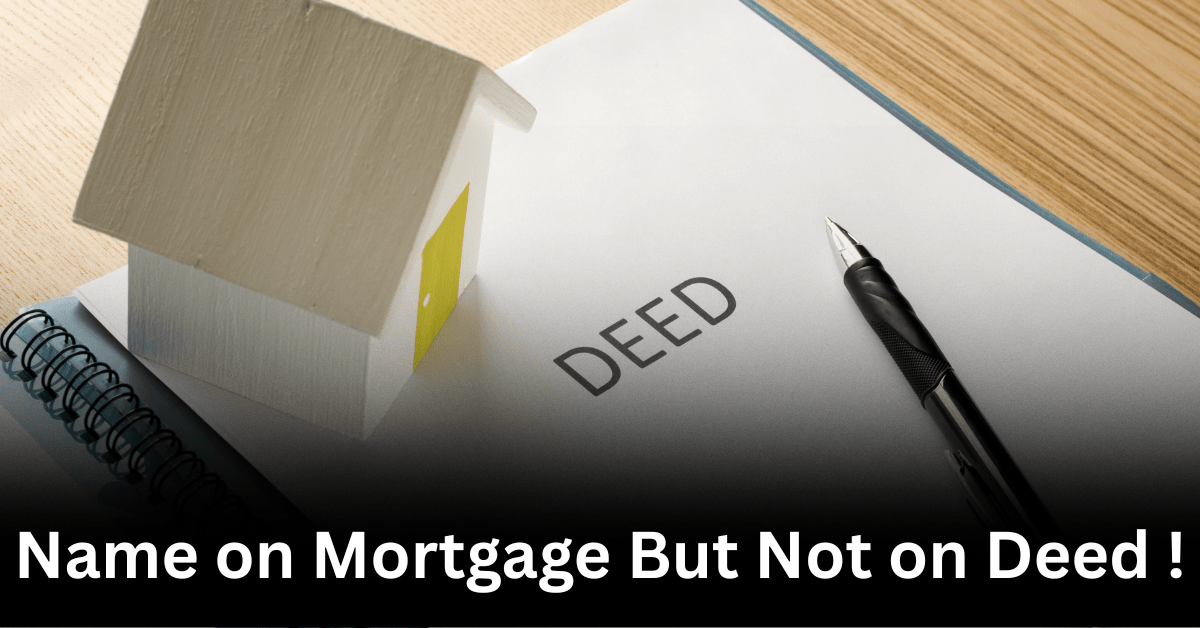Owning a home is a dream for many people, but navigating the technicalities and legalities can sometimes be confusing. One situation that frequently arises is when your name is on the mortgage but not on the deed. This can occur for various reasons, such as financial or legal considerations. In this article, we will explore what it means to have your name on the mortgage but not the deed, the implications it may have, and what options are available to address the situation.
Understanding the Difference Between a Mortgage and a Deed
Before delving into the specifics of the topic, let’s first establish the distinction between a mortgage and a deed. A mortgage is a loan taken out to finance the purchase of a property. It outlines the terms of repayment, interest rates, and other financial details. On the other hand, a deed is a legal document that transfers ownership of the property.
When you assume a mortgage, you become responsible for repaying the loan and are listed as the borrower. The deed, however, specifies who actually owns the property. Usually, the names on the mortgage and the deed are the same, but circumstances may arise where this is not the case.
Reasons for Name Discrepancies
There can be several reasons why your name might appear on the mortgage but not on the deed. Let’s take a look at a few common scenarios:
| Scenario | Explanation |
|---|---|
| Financial constraints | If you’re facing financial difficulties, a lender may require a co-signer to secure the mortgage. The co-signer will appear on the mortgage but not the deed. |
| Estate planning | In certain situations, it may be more advantageous for estate planning purposes to have the property titled solely in one person’s name while both individuals are on the mortgage. |
| Non-occupying spouse | When one spouse has a high credit score and income, the mortgage might be solely in their name to secure a better interest rate, even if both spouses will live in the property. |
Implications and Considerations
Having your name on the mortgage but not the deed can have significant implications. It’s crucial to understand the potential consequences and evaluate the situation carefully:
- If your name is not on the deed, you do not have a legal claim to the property. Thus, you won’t have the right to sell, transfer, or make decisions about the property without the owner’s consent.
- In case of default on the mortgage, you may still be held financially responsible for repayment, regardless of not being listed on the deed.
- Applying for loans or credit using the property as collateral might be more challenging if you aren’t named on the deed.
- If the property owner passes away, you may encounter difficulties in securing your rights to the property unless you are listed on the deed.
While there might be potential risks associated with not being listed on the deed, it’s essential to carefully consider your unique circumstances and consult with legal and financial professionals for personalized guidance.
Options to Address the Situation
If you find yourself in a situation where your name is on the mortgage but not on the deed, you have a few options to consider:
- Talk to the owner: Communicate openly with the individual listed on the deed. Discuss concerns, expectations, and potential plans for the property.
- Obtain legal advice: Consult with a real estate attorney who can guide the best course of action based on your specific circumstances.
- Consider refinancing or modifying the mortgage: If all parties involved agree, refinancing the mortgage or modifying the existing loan may be an option to include your name on the deed.
- Create a legal agreement: You could draft a contract that outlines your rights, responsibilities, and any financial contributions towards the property. This agreement can help protect your interests in the absence of being listed on the deed.
In Conclusion
While it may seem unusual to have your name on the mortgage but not on the deed, there are various reasons why this situation may occur. Understanding the implications and seeking professional advice can help you navigate this complex issue. Remember, every situation is unique, so it’s important to evaluate your options based on your specific circumstances.
So, if you find yourself in this situation, take proactive steps to address the matter and find the best solution for everyone involved.
Frequently Asked Questions About the Name On the Mortgage But Not On the Deed: The Hidden Truths Behind Property Ownership
Can I Be On A Mortgage But Not On The Deed?
Yes, it’s possible. Being on the mortgage gives financial responsibility for the loan.
What Are The Risks Of Being Only On The Mortgage?
You’re responsible for the mortgage payments, but don’t have ownership rights.
Can I Be Added To The Deed Later, If Only On The Mortgage?
Yes, you can. It usually involves a legal process and mutual agreement.
Will Being On The Mortgage Affect My Credit?
Yes, missed payments can negatively impact your credit score.
Ismail Hossain is the founder of Law Advised. He is an Divorce, Separation, marriage lawyer. Follow him.





Leave a Reply